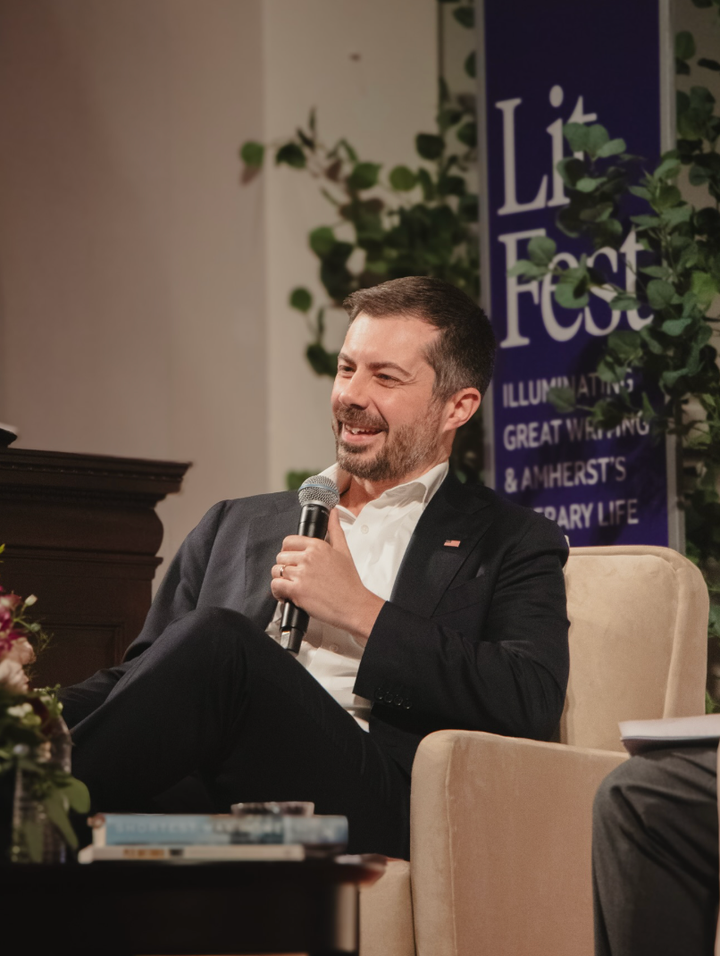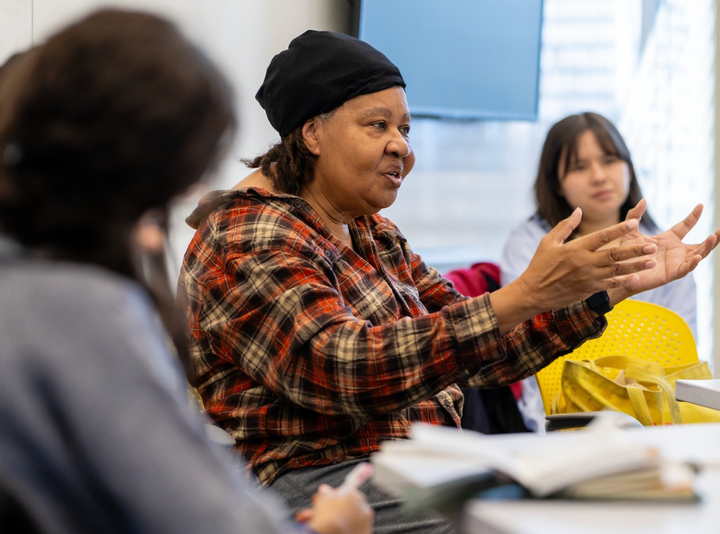Behind the Rhonda Cobham-Sander Annual Lecture
Join Amherst in welcoming acclaimed poet, essayist, and cultural critic Hanif Abdurraqib for the inaugural Rhonda Cobham-Sander Annual Lecture. Managing Arts & Living Editor Mila Massaki Gomes ’27 writes about this student-driven initiative and invites all to celebrate this milestone event.

Next Wednesday, Amherst College will welcome Hanif Abdurraqib, American essayist, poet, and social critic, to the inaugural session of the Rhonda Cobham-Sander Annual Lecture. Besides being highly anticipated for obvious reasons (Abdurraqib’s phenomenal writing and performance), the inaugural lecture and craft talk mark a moment of rebirth in student agency in the English department, as well as celebrating the legacy left behind by a longtime professor.
The new annual lecture gets its name from Amherst College’s beloved writer and retiring Emily C. Jordan Folger Professor of Black Studies and English C. Rhonda Cobham-Sander. Cobham-Sander grew up in the Caribbean at a time of literary prosperity. Caribbean authors were making a name for themselves globally, and according to Cobham-Sander, “A huge cultural ferment [was happening there] during the 1970s, a sense that you were living through the emergence of a major literary tradition. It was in the air.”
Her classes, “The Creole Imagination,” “Issues of Gender in African Literature,” and “Childhood in Caribbean and African Literature,” were a manifestation not only of her passion for Caribbean literature but of the relevant challenges and issues that they present on race, gender, and history. She also taught two of the three core courses in Black studies — “Introduction to Black Studies” and “Research Methods,” — as well as the introductory English courses “Representing Illness” and “Reading, Writing, and Teaching.”
“‘I and I’: Epitaphs for the Self in the Work of V.S. Naipaul, Kamau Brathwaite, and Derek Walcott” is Cobham-Sander’s recent book, which focuses on how these three famous Caribbean writers find forms of consolidating their literary legacies in their later works. Currently, she is working on two new projects. One of them is “Amital Queer: Aunts, Aunty Men and Other Anansis,” an exploration of how Caribbean writers use the idea of the cross-gendered aunt (“tantie”) of oral performance to both subvert and support class and gender boundaries. The other is “Corporeal States: Body, Nation, Text,” which argues that “using gendered metaphors to shore up the identity of the nation-state in African literature may have the unintended consequence of destabilizing our assumptions about what constitutes a body and what defines a text.”
In her more than 20 years of bringing wisdom to the Amherst College community — including serving as a Special Assistant to the President for Diversity and Inclusion from 2004 to 2008 — Cobham-Sander remarked that one of the most exciting developments was how the growth in student body diversity transformed the campus culture. Besides being interested in bringing in new voices to the academic world, one of her most significant endeavors is trying to find how we can “generate new cultural forms in difficult spaces” and talk about important human issues in spaces where they are not necessarily welcomed or seen. Her most recent courses, “Digital Africas” and “Panama Silver, Asian Gold,” for example, integrated digital humanities approaches into the study of Caribbean and African literature.
After such an astounding and fruitful career, the Black studies and English departments wanted to find a way of honoring Cobham-Sander’s legacy. The goal is to invite writers to campus who embody Combham-Sander’s values — diversity, equity, inclusion (DEI) awareness on issues of race, gender, and history — and, most importantly, she says, “generate new cultural forms in difficult spaces.” Serendipitously, this will to remember Cobham-Sander coincided with a desire of both departments to bring back student initiative and input when it comes to organizing events or departmental changes and Cobham-Sander’s own wish to find new ways of bringing diverse voices to campus.
Part of the idea for a student-led Rhonda Combham-Sander Annual Lecture actually came from the desire of the English Student-Steering Committee (ESSC) to bring more writers to campus and get English majors more involved in coordinating department events. The leaders of the student-steering committee, Gabrielle Avena ’25, Mel Arthur ’25, and Beatrice Agbi ’26, explained that when they were freshmen, the English department’s student committee was nearly non-existent. From completely redoing the English Studies Lounge (Bruss Room) to hiring professors George Abraham and Nozomi Nakaganeku Saito, the English student committee has already done a lot to rebuild itself. The Rhonda Combham-Sander Annual Lecture is a way to ensure that student-led initiatives stay alive even after current leaders graduate and faculty members retire or go on sabbatical.
Arthur explained that putting the lecture together was not an easy feat. After meeting for months with other English students, the student leaders reached a consensus on a few writers proposed by the committee. What followed was weeks of research on the breadth of topics each writer would cover, how their values would relate to those of Cobham-Sander, and the cost of bringing each of them to campus. With the help of Winthrop H. Smith 1916 Professor of American Studies and English and Head of the English Student-Steering Committee Lisa Brooks, the three student leaders crafted a proposal to the English department. To their surprise, their top choice got approved and funded: this year’s inaugural speaker, Hanif Abdurraqib.
While he competed with other fantastic writers for the spot, student leaders felt that Abdurraqib was undoubtedly the best fit. Abdurraqib is not just another cultural critic, writer, and poet; his work generates new ideas, questions, and ways we can move through feelings and complex societal pressures. Agbi said that Abdurraqib’s work is unlike anything they’ve read before, reminding us to “find words to articulate feelings that are often hard to talk about.” Arthur pointed to Abdurraqib’s most recent book, “There’s Always This Year,” and its use of basketball as a metaphor for grief. “Hanif is important to us because of the moment we exist in. He is writing about all the topics we, as Amherst students, [seem] concerned and interested in.” From diversity in the sphere of music, growing up as a Black man in America, and dealing with societal pressures to conform to harmful stereotypes of masculine identity, Hanif’s work is a reminder of Cobham-Sander’s values of diversity, inclusion, awareness of issues of race, gender, and history.
More than anything, Avena explained, Abdurraqib’s work is meant to be more than just read — it must be heard. “He is a very talented performer,” Avena said, “so it is not just a matter of the quality of his writing being shared, but the fact that he is coming here, to our chapel, to bring it to life.” The leaders also mentioned that Abdurraqib’s work, which is often entwined with music, will bolster the lecture to be more than a simple talk — it will be a performance.
As Amherst students in the middle of midterms, theses, labs, and other academic work that calls out to us, it is hard to find time to go out to lectures like this. But the Rhonda Cobham-Sander Annual Lecture is the embodiment of our commitment to learn from different voices — voices often erased. More than that, the lecture is a reminder of our privilege as students and members of the Amherst community to have the power to exercise change and work for the betterment we want to see. The Rhonda Combham-Sander Annual Lecture and Hanif Abdurraqib remind us of everything we achieved, fought for, and can still do.
If you wish to see this performance, please come to Johnson Chapel on April 16 at 7 p.m. to listen to Abdurraqib’s lecture and celebrate the achievements of the English and Black studies departments.





Comments ()